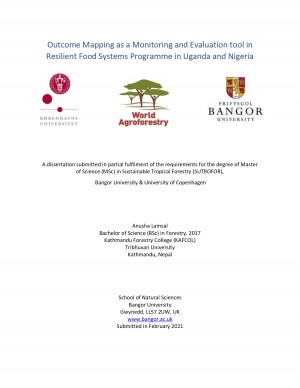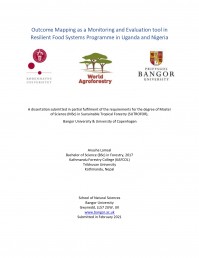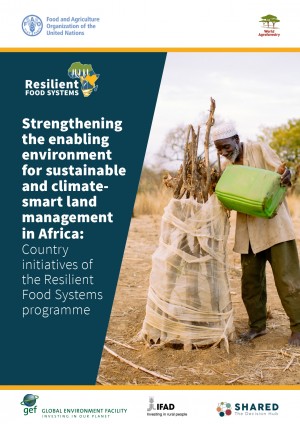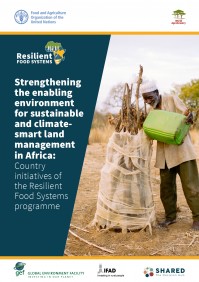Agro-pastoral field school members are investing in side businesses and prospering
22 May 2023
Project Name
Fostering Sustainability and Resilience for Food Security in Karamoja sub-region
GEF Implementing Agency
FAO, UNDP
Objective
To improve food security and the long-term environmental sustainability and resilience of food production systems in the Karamoja sub-region by addressing environmental drivers of food insecurity and their root causes.
Project Targets
land under integrated and sustainable management
GHG emissions avoided or reduced
beneficiary households
The Karamoja sub-region of Uganda is highly vulnerable to the impacts of climate change and has been experiencing increasing and unpredictable periods of drought and rising levels of environmental degradation. Additional factors contributing to low agricultural productivity include low levels of agricultural support, limited access to capital and markets, and a lack of policy concerning natural resource management.
As a result of these environmental and climate challenges, the vast majority of people in Karamoja face chronic food insecurity and poverty, with women and female-headed households being especially vulnerable.
The RFS Uganda project seeks to build on proven successful practices, systems and mechanisms for the scaling up of INRM and SLM practices. The project is also piloting SLM and INRM technologies that have not yet been promoted in the Karamoja sub region. This includes, for example, rainwater harvesting and rangeland rehabilitation techniques. The project also promotes alternative sources of livelihoods within existing value chains.
The project is structured around three principal components:
The project aims to meet the following targets:
Supportive policies and incentives at district level are strengthened to support smallholder agriculture, food value-chains and INRM.
Land area under INRM and SLM practices is increased for a more productive Karamoja landscape.
A framework for multi-scale monitoring and assessment of levels of resilience and global environmental benefits is established.
RFS Uganda brings together and facilitates coordination between different stakeholders, primarily through the establishment of multi-stakeholder platforms at local, regional and national levels.
Key stakeholders at the national level include the Ministry of Agriculture, Animal Industries and Fisheries (Zonal Agricultural Research and Development Institute); Ministry of Water and Environment; Ministry of Energy and Mineral Development; Ministry of Lands and Urban Development; Ministry of Trade, Industry and Cooperatives; Office of the Prime Minister; National Forestry Authority; National Environmental Management Agency; and the Office of Karamoja Affairs.
Within the target geography, key stakeholders include the district local governments in the Karamoja sub-region, land users, their groups and leaders, NGOs and CSOs.
Each RFS country project conducts activities that fall under common thematic areas within the programme. Explore each project theme relevant to the RFS Uganda country project below to see which activities are being implemented under each theme.
Stories from the Field
Explore our stories from the field to learn more about the activities, milestones, lessons learned, and achievements of the RFS Uganda project.
Relevant Resources
We have a growing library of reports, briefs, case studies, media, tools and guidelines. Explore all resources related to the RFS Uganda project to get greater insight into our programme activities.


A dissertation submitted by Anusha Lamsal in partial fulfilment of the requirements for the degree of Master of Science (MSc) in Sustainable Tropical Forestry (SUTROFOR), Bangor University & University of Copenhagen.
ABSTRACT:
The Resilient Food Systems (RFS) programme aims to respond to chronic food insecurity and targets in fostering sustainability and resilience among smallholder farmers in 12 sub-Saharan African (SSA) countries. This research investigated the potential for OM methodology in the RFS project in the Karamoja subregion of Uganda and northern Nigeria. This qualitative study offered OM training sessions that trained the participants from both countries to identify project vision, mission, boundary partners, outcome challenges, progress markers, strategy maps, and organizational practices. The participants used OM methodology to track the behavioural change in the boundary partners involved in the RFS projects. Participants from both countries identified 4-5 important RFS project boundary partners that need behavioural changes and defined outcome challenges, progress markers and strategy maps for each of them. RFS Uganda identified Local Farming Communities (Smallholder farmers, women, and youth) who were also the ultimate beneficiaries, National Steering Committee, Local Government, Media, and the Implementing Partners as the most important BPs. Similarly, Smallholder farmers (women and youth), the Federal Ministry of Agriculture, ADPs of all 7 states, Private sectors, and Media were identified as the most important BPs by RFS Nigeria. This study concludes that OM methodology can be implemented to track behavioural changes in Boundary Partners involved in RFS projects. To incorporate tracking of behavioural change into the project monitoring and evaluation plan, it is important to configure and adjust OM methodology to the country’s specific contexts and phases of RFS projects. When continued in other RFS countries, it should incorporate gendered perspectives in every OM stage possible.
The data obtained during this thesis was mainly used to write this MSc dissertation. It was also used to contribute to a project report and research paper informing Uganda, Nigeria, and other RFS countries about project scaling and policy influence using OM as a method for Monitoring and Evaluation (M&E). This research contributes to the overall SSA Food Security and Sustainability Goals of the RFS as well as one of the objectives of ICRAF to address the Sustainable Development Goals (SDG) 2 aimed at ending poverty, achieving food security and improved nutrition and encouraging sustainable agriculture.


Barriers to implementation of sustainable land management (SLM) practices limit their ability to contribute to addressing land degradation. This report presents country case studies from the Resilient Food Systems programme highlighting SLM project activities undertaken in six countries in sub-Saharan Africa, and the lessons learned during their implementation. The innovative approaches to bridging governance and institutional gaps have demonstrated positive impacts on both the environment and livelihoods of rural communities.


Farmer Field Schools (FFS) are helping communities work together to achieve common goals. In this presentation, RFS Tanzania, Burundi and Uganda present their experiences with FFS as well as their lessons learned.
This presentation was part of Learning Lab 5: Advisory services supporting community innovations: integrated landscape management through Farmer Field Schools and Agro-Pastoral Field Schools of the 2022 Resilient Food Systems Annual Workshop in Blantyre, Malawi.